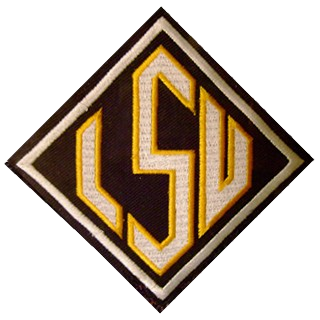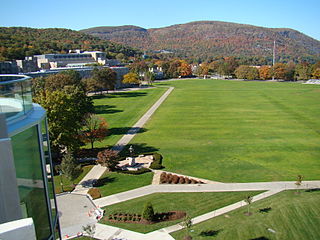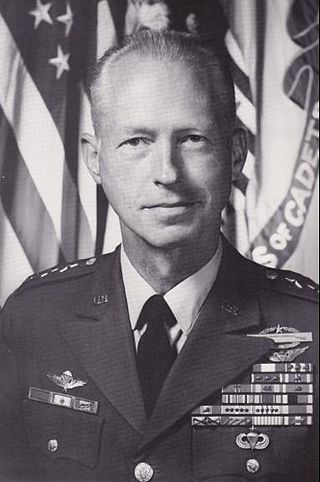
The United States Military Academy (USMA) is a United States service academy in West Point, New York. It was originally established as a fort during the American Revolutionary War, as it sits on strategic high ground overlooking the Hudson River 50 miles (80 km) north of New York City. It is the oldest of the five American service academies and educates cadets for commissioning into the United States Army.

The Royal Military Academy Sandhurst, commonly known simply as Sandhurst, is one of several military academies of the United Kingdom and is the British Army's initial officer training centre. It is located in the town of Sandhurst, Berkshire, though its ceremonial entrance is in Camberley, Surrey, southwest of London. The academy's stated aim is to be "the national centre of excellence for leadership". All British Army officers, including late-entry officers who were previously Warrant Officers, as well as other men and women from overseas, are trained at the academy. Sandhurst is the British Army equivalent of the Britannia Royal Naval College and the Royal Air Force College Cranwell.

"Taps" is a bugle call sounded to signal "lights out" at the end of a military day, and during patriotic memorial ceremonies and military funerals conducted by the United States Armed Forces. The official military version is played by a single bugle or trumpet, although other versions of the tune may be played in other contexts. It is also performed often at Girl Guide, Girl Scout, and Boy Scout meetings and camps. The tune is also sometimes known as "Butterfield's Lullaby", or by the first line of the lyric, "Day Is Done". The duration may vary to some extent.

The Virginia Tech Corps of Cadets (VTCC) is the military component of the student body at Virginia Polytechnic Institute and State University. Cadets live together in residence halls, attend morning formation, wear a distinctive uniform, and receive an intensive military and leadership educational experience similar to that available at the United States service academies. The Corps of Cadets has existed from the founding of the Virginia Agricultural and Mechanical College in 1872 to the present-day institution of Virginia Tech, which is designated a senior military college by federal law. As of August 2021, about 1,200 cadets are currently enrolled in the program.

The Fightin' Texas Aggie Band is the official marching band of Texas A&M University. Composed of over 400 men and women from the school's Corps of Cadets, it is the largest military marching band in the United States. The band's complex straight-line marching maneuvers are performed exclusively to traditional marches.

Valley Forge Military Academy and College (VFMAC) is a private boarding school and military junior college in Wayne, Pennsylvania. It follows in the traditional military school format with army traditions. Though military in tradition and form, the high school portion of VFMAC, Valley Forge Military Academy, is a college-preparatory boarding institution specializing in student leadership. VFMAC's administration is composed almost entirely of current or retired military and the board of trustees is almost entirely alumni. Some graduates pursue careers in the armed services and VFMAC has graduated one Rhodes Scholarship recipient.

United States military bands include musical ensembles maintained by the United States Army, United States Marine Corps, United States Navy, United States Air Force, and United States Coast Guard. More broadly, they can also include musical ensembles of other federal and state uniformed services, including the Public Health Service and NOAA Corps, the state defense forces, and the senior military colleges.
"Tech Triumph" is the fight song of Virginia Tech. It was composed in 1919 by Wilfred Pete Maddux and Mattie Eppes (Boggs).
The Virginia Tech Regimental Band, also known as the Highty Tighties, VPI Cadet Band, or Band Company was established in 1893 as a military marching band unit in the Virginia Tech Corps of Cadets at Virginia Polytechnic Institute and State University. Virginia Tech also has had since 1974 a non-military marching band, The Marching Virginians.

"The U.S. Air Force" is the official song of the United States Air Force, adopted in the late 1940s, and is often referred to as "Wild Blue Yonder".

La Salle Military Academy was a Catholic school with middle school/junior high school and high school divisions located in Oakdale, New York. It closed in 2001, and the school's extensive campus is now owned by St. John's University, located in nearby Jamaica, Queens.

The Louisiana State University Tiger Marching Band is the marching band of Louisiana State University (LSU). The band has 370 members and performs at all LSU football home games, all bowl games, and away games.

A corps of drums, sometimes known as a fife and drum corps or simply field music, is a traditional European military music formation. Historically, a Corps of Drums' primary role was communication. Today, the primary role of a Corps of Drums is ceremonial, performing in parades and military ceremonies. Besides drums, this formation may contain a variety of instruments, including trumpets, bugles, and fifes.

The United States Military Academy and grounds were declared a National Historic Landmark in 1960 due to the Revolutionary War history and the age and historic significance of the academy itself. The majority of the buildings in the central cadet area are historic.
The history of the United States Military Academy can be traced to fortifications constructed on the West Point of the Hudson River during the American Revolutionary War in 1778. Following the war, President Thomas Jefferson signed legislation establishing the United States Military Academy (USMA) on the site in 1802. In 1817 the academy was transformed by the appointment of Sylvanus Thayer who drastically reformed the curriculum.

The Plain is the parade field at the United States Military Academy at West Point, New York. The flat terrain of the Plain is in contrast to the varied and hilly terrain of the remainder of the campus. The Plain rises approximately 150 feet (45 m) above the Hudson River and has been the site of the longest continually occupied U.S. Army garrison in America since 1778. In its early years, the entire academy was located on the Plain and it was used for varying activities ranging from drill and mounted cavalry maneuvers to an encampment site for summer training to a sports venue. Currently, the Plain refers to just the parade field where cadets perform ceremonial parades.

Sidney Bryan Berry was a United States Army Lieutenant General, Superintendent of West Point (1974–1977), and Commissioner of Public Safety for the state of Mississippi (1980–1984).

Mark Phillip Hertling is a retired United States Army Lieutenant General. From March 2011 to November 2012, he served as the Commanding General of United States Army Europe and the Seventh Army. Hertling served in Armor, Cavalry, planning, operations and training positions, and commanded every organization from Platoon to Field Army. He commanded the 1st Armored Division and Task Force Iron/Multinational Division-North in Iraq during the troop surge of 2007 to 2008.

For more than a century the Military Parade of Chile or Great Military Parade of Chile has been a tradition within the Independence Day holidays in Chile. It is held in Santiago, Chile's O'Higgins Park on September 19 yearly in honor of the Glories of the Chilean Army with a military parade involving not just the ground forces but by the rest of the Chilean Armed Forces: the Chilean Navy, the Chilean Air Force, and the Carabineros de Chile. It is also in honor of the anniversary of the formal inauguration on that day in 1810 of the First Government Junta, which witnessed the first military parade of the independent nation at the Plaza de Armas, Santiago. It is the final act of the national independence celebrations, which are broadcast through TV and the Internet and radio.


















